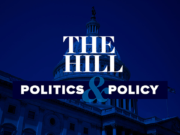Last Friday, Senate Minority Leader Mitch McConnell addressed the American Enterprise Institute concerning “a culture of intimidation” in Washington that may have influenced the IRS’s targeting of conservative groups applying for tax-exempt status. According to McConnell, a number of government agencies, far-left interest groups, and President Obama’s own remarks have been working to “shut down the competition of ideas” and silence conservative voices in politics.
Sen. McConnell’s claim that the IRS’s harassment of conservative organizations fits within a broader government effort to stifle political speech is corroborated by recent developments in other government agencies. Several of these bodies like the Securities and Exchange Commission (SEC) and the Federal Communications Commission (FCC) have crept into the business of regulating campaign finance – even though this task has nothing to do with the agencies’ legitimate purpose.
The mission of the SEC, for example, is “to protect investors, maintain fair, orderly, and efficient markets, and facilitate capital formation.” The mind boggles at how forcing publicly traded companies to disclose their campaign spending is related to any of these goals, but that’s exactly what the SEC is contemplating right now. The FCC is tasked with several goals, like promoting diversity and competition in media and communication services. Yet the FCC has also been getting into the disclosure game, voting in 2012 to force broadcasters to post political ad revenue information online, and facing increasing pressure this year to more aggressively enforce existing disclosure requirements.
Those that disagree with Sen. McConnell generously assume that the IRS was acting alone and did not have an ideological purpose behind its targeting of conservative groups. But even if that’s true, the scandal still demonstrates the dangers of leaving our free speech rights in the hands of government agencies that aren’t equipped to navigate the complexities of First Amendment law. The IRS, SEC, FCC and other non-Federal Election Commission agencies need to ‘just say no’ to regulating political speech.
McConnell portrayed disclosure generally, and the DISCLOSE Act, as attempts to target and shame individuals that dare to voice unpopular political opinions (or those certain parties may disagree with). He cited the Supreme Court’s case history on disclosure, specifically the 1958 case NAACP v. Alabama, in which the Court ruled that the NAACP need not provide its membership lists to the state of Alabama, appropriately recognizing that such lists were only sought for the purposes of intimidating NAACP members.
55 years later, federal and state governments may be more trustworthy than the states of the Jim Crow South, but our freedoms are too valuable and too important to gamble on trusting politicians. The significant principle that anonymity affords an essential protection to unpopular viewpoints remains a true and, indeed, crucial, point in all discussions of free speech and campaign finance law.
Too much disclosure can be a dangerous requirement when it chills speech or leads to discrimination; a point McConnell has been making for many years. Those that shrug off the threats to free speech posed by these agencies need to take a second look at the issue. As the Senator himself explained, “just because it’s McConnell pulling the alarm doesn’t mean there’s not a fire.”













